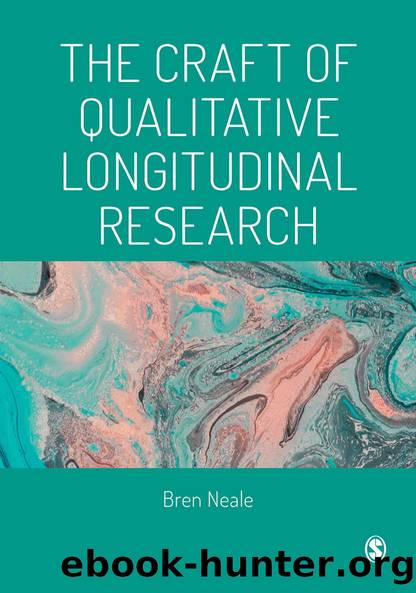The Craft of Qualitative Longitudinal Research by Bren Neale

Author:Bren Neale [Neale, Bren]
Language: eng
Format: epub
ISBN: 9781473995444
Barnesnoble:
Publisher: SAGE Publications
Published: 2021-05-25T00:00:00+00:00
Gaining consent for archiving
Forward planning is equally important when it comes to seeking consent for archiving. For QL enquiry, gaining consent of any kind can be time-consuming and difficult, particularly if contact with participants has been interrupted or lost (see Chapter 5). For this reason, it is now regarded as standard practice to seek consent for archiving alongside the general consent process prior to fieldwork (Corti et al. 2020). For QL research, such consent can be revisited at key moments in the research process.
At this point, it is worth clarifying exactly what participants are being asked to consent to in relation to the future use of their data. Can consent for archiving be properly informed when future uses of a dataset (lines of enquiry, interpretations, contexts for re-use) are unknown and cannot be anticipated? In the context of an evolving QL study, where the themes under investigation may radically shift over the course of a study, the notion of informed consent is problematic in any case. It canât be specified with any certainty for the work of the original researchers, let alone for the work of others, who may subsequently use a dataset for a different purpose (detailed in Chapter 8).
One way forward is to reframe the consent process in terms of enduring consent. This generic or âblanketâ model of consent clarifies that data may be used in new research contexts, in relation to unanticipated themes, over unspecified timescales, and without the need to re-contact participants in future. Procedural consent, i.e. consent for the way that data are to be stored, managed, accessed and generally protected, can be specified in advance and built into this model of enduring consent. Enduring consent is commonly used in medical research, and has obvious utility for longitudinal enquiry and for the future use of archival data (Neale and Bishop 2012b; Neale 2013; ESRC 2016; Hughes and Tarrant 2020b).
It is also worth noting here that, for QL studies at least, the vast majority of participants readily agree to the archiving of their data (Neale 2013). They wish to have their accounts on record as part of social history; indeed, such an agenda may be the driving force for a project (Berriman and Thomson forthcoming). It is important to clarify with participants that, unlike popular archives, research archives are not publicly available resources. Access can be carefully controlled and restricted to those working in officially recognised research institutions, who will pledge to uphold high ethical standards. In these circumstances, participants see little distinction between sharing their accounts with one bona-fide research team or several such teams through the medium of the archive (Kuula 2010â11; Weller 2012; Neale and Bishop 2012a). Kuulaâs research on participant perceptions of archiving revealed that, âparticipants perceive open access to research data for other researchers as self-evidentâ (Kuula 2010â11: 15). This was certainly our experience within Timescapes, where over 95% of participants consented to archiving. Even where data are virtually impossible to anonymise, or are highly sensitive, consent is not usually withheld.
Download
This site does not store any files on its server. We only index and link to content provided by other sites. Please contact the content providers to delete copyright contents if any and email us, we'll remove relevant links or contents immediately.
Rewire Your Anxious Brain by Catherine M. Pittman(18654)
Talking to Strangers by Malcolm Gladwell(13370)
The Art of Thinking Clearly by Rolf Dobelli(10489)
Mindhunter: Inside the FBI's Elite Serial Crime Unit by John E. Douglas & Mark Olshaker(9342)
Becoming Supernatural by Dr. Joe Dispenza(8217)
Change Your Questions, Change Your Life by Marilee Adams(7780)
Nudge - Improving Decisions about Health, Wealth, and Happiness by Thaler Sunstein(7706)
The Road Less Traveled by M. Scott Peck(7603)
The Lost Art of Listening by Michael P. Nichols(7506)
Mastermind: How to Think Like Sherlock Holmes by Maria Konnikova(7347)
Enlightenment Now: The Case for Reason, Science, Humanism, and Progress by Steven Pinker(7313)
Win Bigly by Scott Adams(7197)
The Way of Zen by Alan W. Watts(6614)
Daring Greatly by Brene Brown(6513)
Big Magic: Creative Living Beyond Fear by Elizabeth Gilbert(5771)
Grit by Angela Duckworth(5614)
Ego Is the Enemy by Ryan Holiday(5447)
Men In Love by Nancy Friday(5240)
The Laws of Human Nature by Robert Greene(5208)
